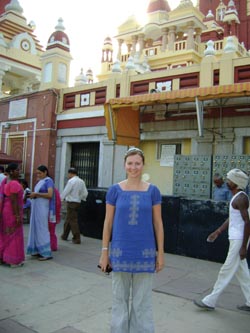Fulbright experience offers Ph.D. insight into Indian history and life
| Applying for and winning a Fulbright can be a life-changing experience. That’s what Temple Ph.D. candidate Michele Louro discovered when she won a Fulbright for 2008-2009 to study Indian history.
The Fulbright Program, sponsored by the U.S. Department of State, provides participants worldwide with the opportunity to observe each others’ political, economic and cultural institutions, exchange ideas and conduct joint research. Since winning a Fulbright and travelling to India, Louro has made great progress on her dissertation on “Remapping Indian Anti-colonial Nationalism.” She describes the work as “exploring India’s freedom struggle against the British from an international perspective… as well as exploring India’s relationship with other international movements for social equality.” At the same time, she is learning to live in a new culture and communicate in a new language. For Louro, the door to this new life opened in an unexpected way. Her fascination with Indian history, which began during an undergraduate course she took on Modern South Asian History, |
 Photo courtesy Maura
Michele Louro, a Temple Fulbright scholar and Ph.D. student, is starting to feel at home in Delhi, India, where she is researching India’s independence movement and its place in global affairs.
|
|
led to graduate study at Temple and ultimately her Fulbright application. A trip to India in 2005 strengthened both her background and interest. Much of her current work, which focuses on Jawaharlal Nehru, India’s first prime minister, and the protégé of Mahatma Gandhi, could only be accomplished in India. “For this project, I have examined Nehru’s personal papers, as well as the papers of the Indian National Congress, the institution that organized and led India’s freedom struggle,” she said. Along with her own research, Louro has been consulted to study documents for international organizations, such as the League against Imperialism, which links India with other nations who have struggled with or are struggling with Imperialism. She also spends time volunteering at a local non-governmental organization (NGO) in Delhi that “helps disadvantaged women in the city by offering micro-financing schemes, advocacy, and labor organization.” |
|
|
Other Temple winners talk about the Fulbright experience
The following Temple students, currently abroad, also applied for and received Fulbright grants last year. “I am trying to show that [against popular belief] democracy is actually indigenous to Islam and this region long before the European Enlightenment… Given that, at my core I see myself as the wrecking ball to this [accepted] ‘Clash of Civilizations’ worldview” “It is not only about the research and work duties; the program guidelines also encompass a responsibility to be a good cultural representative. To me, this can be as simple as making new friends and being honest and respectful.” “The rhythm of Spanish life is very 'tranquilo' (calm and easy), as Spaniards are fond of saying. But you can always spot an American abroad by their quick tendency to fill their schedule to the brim with various activities, as I have done.” — Stephen Twigg |
Louro starts her day late by western standards, around 9:30 or 10 a.m., when the shops begin to open. She goes to the Nehru Memorial Museum and Library, National Archives of India, and the Archives of Contemporary History at Jawaharlal Nehru University to research for most of the day, stopping in the afternoons to attend seminars and workshops across Delhi. Louro frequents several universities in the city including Jamia Millia Islamia, Jawaharlal Nehru University, and Delhi University. “Adapting to life in India can be challenging,” said Louro. “I live in Delhi, which is a very large city in both population and geographic space. As such, it is bustling with people, and life is very fast-paced. Keeping up can be exhausting.” But navigating the city is less difficult because of her love for the culture, and her background in Hindi. Once a week, Louro attends language class, developing both listening and practical skills that she began studying last year through a Temple class in Beginners Hindi. “Practicing Hindi with shopkeepers, rickshaw drivers, and neighbors has been helpful,” she said. The federally sponsored Fulbright U.S. Student Program provides opportunities to study, conduct research and teach in other countries. The grants aim to increase mutual understanding among nations through educational and cultural exchange while serving as a catalyst for long-term leadership development. The program awards approximately 1,300 grants annually and operates in more than 140 countries worldwide. The grants |
|
provide funding for travel, health and living expenses in addition to full or partial tuition. Louro plans to use the Fulbright experience to complete her dissertation, compiling work she has done in the U.S., London, Amsterdam, and now India. She is confident that the knowledge she has gained extends beyond her research. “India is an amazing place," she says. "I feel like this experience will change my interpretations of the past, but also my views on life in general.” — Stephen Twigg |
|